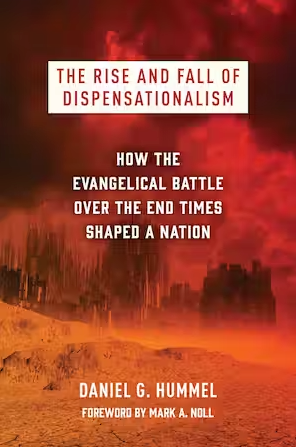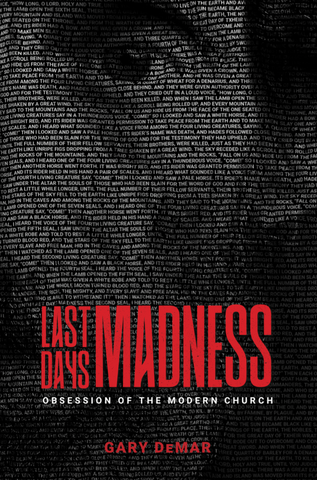Bart Ehrman, a New Testament scholar at the University of North Carolina at Chapel Hill, has a bone to pick with Jesus and Bible prophecy. He has written on the topic of Jesus and prophecy in Jesus: Apocalyptic Prophet of the New Millennium (1999), Misquoting Jesus:The Story Behind Who Changed the Bible and Why (2005),and his most recent book Armageddon: What the Bible Really Says About the End (2023). The arguments in Armageddon aren’t much different from what is in his previous books about Jesus and prophecy. His critique of dispensationalism is not much different from the way Evangelicals have critiqued the position for decades! Philip Mauro, once an enthusiastic supporter of dispensationalism, by 1918 he had rejected it.
Am deeply thankful, however, that the time came (it was just ten years ago) when the inconsistencies and self-contradictions of the system itself, and above all, the impossibility of reconciling its main positions with the plain statements of the Word of God, became so glaringly evident that I could not do otherwise than renounce it.[1]
Oswald T. Allis offered a detailed refutation of dispensationalism in his 1948 book Prophecy and the Church: An Examination of the Claim of Dispensationalists that the Christian Church is a Mystery Parenthesis which Interrupts the Fulfilment to Israel of the Kingdom Prophecies of the Old Testament. There have been many more critiques since Allis’ influential work. The most recent is Daniel G. Hummel’s The Rise and Fall of Dispensationalism.

The Rise and Fall of Dispensationalism
Measured and irenic, Hummel objectively evaluates evangelicalism’s most resilient and contentious popular theology. As the first comprehensive intellectual-cultural history of its kind, The Rise and Fall of Dispensationalism is a must-read for students and scholars of American religion.
Buy NowEhrman’s book Armageddon was written for his already skeptical fanbase. It is not a serious study of the topic since he leaves so much out.
In his best-selling book Misquoting Jesus, Ehrman describes how he struggled to reconcile what he believed to be errors in the Bible.[2] His pilgrimage from Moody Bible Institute to Princeton changed him forever. His trek down the road to skepticism began with what he describes as “one of the most popular books on campus” at the time, Hal “Lindsay’s [sic] apocalyptic blueprint for our future, The Late Great Planet Earth.” Ehrman writes that he “was particularly struck by the ‘when’” of Lindsey’s prophetic outline of Matthew 24. So was I when I read a copy of The Late Great Planet Earth in 1973. It was on this topic that our paths diverged. It happened to me when I read J. Marcellus Kik’s book Matthew 24. The preterist interpretation of Bible prophecy solves so many supposed interpretive problems. For example, Ehrman writes that Matthew 24 is about “the end of time” (3-4). Where does Ehrman go for sage end-time advice in response? Edgar Whisenant, the man who wrote Why the Rapture Will be in 1988. Matthew 24 is not about the “the end of time.” It’s about the “end of the age.” Ehrman teaches Greek, so he should know this. He should also know and should have informed his readers that many commentators, before and after the rise of dispensationalism, interpreted most of the New Testament in a preterist way as fulfilled prophecy. See my book Wars and Rumors of Wars.
Ehrman writes that “this message [of the soon coming of Jesus to ‘rapture the church’] proved completely compelling to us [at Moody]. It may seem odd now—given the circumstances that 1988 has come and gone, with no Armageddon—but, on the other hand, there are millions of Christians who still believe that the Bible can be read literally as completely inspired in its predictions of what is soon to happen to bring history as we know it to a close.”[3] Instead of questioning the exegetical work of Lindsey and other prophecy writers as if their way of interpreting prophecy has been the only way, Ehrman rejected the authority of the Bible. This is like rejecting the study of biology because there was a time when scientists believed in spontaneous generation.
Michael Ruse, Professor of Philosophy at Florida State University and a self-professed “ex-Christian,”[4] devotes a chapter to the subject of eschatology in his book The Evolution-Creation Struggle.[5] He took a similar path. Tim Callahan writes in his book Bible Prophecy: Failure or Fulfillment?, “Obviously, the gospel had not been preached to the entire world by 70 C.E., even if we interpret the whole world as being nothing more than the Roman Empire.”[6] He makes a mistake by mistranslating the Greek word oikoumenē in Matthew 24:14 as “world.” Some of the confusion on this issue is because of some less than helpful translations found in the King James Version where the Greek words aiōn and oikoumenē are translated as “world” instead of “age (24:3) and “inhabited earth” (24:14). The fulfillment of what Jesus said would happen before that Apostolic Generation passed away (24:34) saw the fulfillment in what we read in passages like Colossians 1:6 and 23, 1 Timothy 3:16, and Romans 1:8 and 16:25-26. Context matters.
Former Late Great Planet Earth admirer Michael Shermer relates the following story: “At Glendale College I challenged my philosophy professor (and now my friend) Richard Hardison, to read The Late Great Planet Earth, believing he would see the light. Instead he saw red and hammered out a two-page, single-spaced typed list of problems with Lindsey’s book. I still have the list, folded and tucked neatly into my copy of the book.”[7] If dispensationalism is the way the church has always interpreted Bible prophecy, these ex-Christians might have a case. But we know that the history of interpretation has not been dispensational. It’s true that many commentators have not interpreted prophecies in a preterist way, but many have and still do.

Last Days Madness
In this authoritative book, Gary DeMar clears the haze of "end-times" fever, shedding light on the most difficult and studied prophetic passages in the Bible, including Daniel 7:13-14; 9:24-27; Matt. 16:27-28; 24-25; Thess. 2; 2 Peter 3:3-13, and clearly explaining a host of other controversial topics.
Buy NowBecause of the popularity of a dispensational hermeneutic, critics of Christianity use it as an apologetic against the Bible. The following encounter took place between the late famed atheist Christopher Hitchens and Douglas Wilson in the 2009 film Collision. (The downloadable film and Study Guide are available here.) Hitchens questioned the reliability of the Gospel accounts regarding Jesus’ comments that “He would reappear in the lifetime of his disciples.” Wilson quickly responded, “No, He said He was going to come back and destroy Jerusalem, which He did in 70 AD, right on the money.”
Here’s how the rest of the exchange took place:
WILSON: When Jesus says in Matthew 24, the moon, the sun is going to go out and the stars fall from the heavens, he is quoting from Isaiah 13 and Isaiah 34. There is de-creation language throughout the Old Testament. Every time it occurs in the Old Testament, it always refers to a military destruction of a nation or a city-state, always. In Isaiah 13, an oracle against the king of Babylon, and then you have the same de-creation language, and then Jesus says in Matthew 24, not one stone is going to be left on another. The disciples say when it is going to happen and Jesus quotes Isaiah, so Jesus is not talking about the end of the space-time universe. He simply isn’t. It has nothing whatever to do with that. It has to do with the destruction of Jerusalem, which happened within one generation, just as Jesus said, authenticating him as a prophet.
HITCHENS: Don’t you have an abnormally unsuspicious mind? If you see someone saying, “I am saying this so the prophecies can be fulfilled.” He knows what the prophecies are, and he says, “the prophecies say if the redeemer comes to Jerusalem, he will come riding a donkey. Where is my donkey? Let me straddle the donkey and come in when it is Passover time.” It says in the books themselves, it says, this was done so that the prophecies might be fulfilled, so, it is a self-consciousness engineering of what would be laughable to call predictive.
WILSON: I will give you the donkey. The donkey could have been arranged. (audience laughter)…. I was talking about the destruction of Jerusalem, which was not arranged that way. So when Jesus predicted the destruction of Jerusalem [around 40 years before it happened], my central point is you interpreted Him as predicting the end of the space-time continuum. He wasn’t talking about that at all. He was predicting the end of the Judaic eon, the temple sacrifices, and Jerusalem, and He did not arrange for the Romans to come in and do that.
Hitchens and people like Ehrman, Callahan, and Shermer (and there are most likely others) do us a favor by attacking spurious Christian prophecy writers who reinterpret time markers like “soon,” “near,” “quickly,” “at hand,” “about to,” and do further damage by interpreting “this generation” to mean any generation except the generation of Jesus’ day, and physicalize stellar phenomena language about the sun and moon going dark and stars falling from the heavens.
Ehrman is a good writer. He brings up some good historical points, but his book Armageddon is far from what one expects from a New Testament scholar.
American Vision Prophecy Books
10 Popular Prophecy Myths Exposed and Answered
Beginner’s Guide to Interpreting Bible Prophecy
The Days of Vengeance: An Exposition of the Book of Revelation
Gog and Magog End-Time Alliance
The Hope of Israel and the Nations
Left Behind: Separating Fact from Fiction
Rapture and the Fig Tree Generation
Young’s Concise Critical Commentary on the NT
[1] Mauro, The Gospel of the Kingdom: With an Examination of Modern Dispensationalism (Boston: Hamilton Brothers, 1928), 3.
[2] Bart D. Ehrman, Misquoting Jesus: The Story Behind Who Changed the Bible and Why (New York: HarperCollins, 2005).
[3] Ehrman, Misquoting Jesus, 13.
[4] Michael Ruse, “Saving Darwinism from the Darwinians,” National Post (May 13, 2000), B3.
[5] Michael Ruse, The Evolution-Creation Struggle (Cambridge, MA: Harvard University Press, 2005).
[6] Tim Callahan, Bible Prophecy?: Failure or Fulfillment? (Altadena, CA: Millennium Press, 1997), 185-189.
[7] Michael Shermer, How We Believe: The Search for God in an Age of Science (New York: W.H. Freeman and Company, 2000), 1-7.

